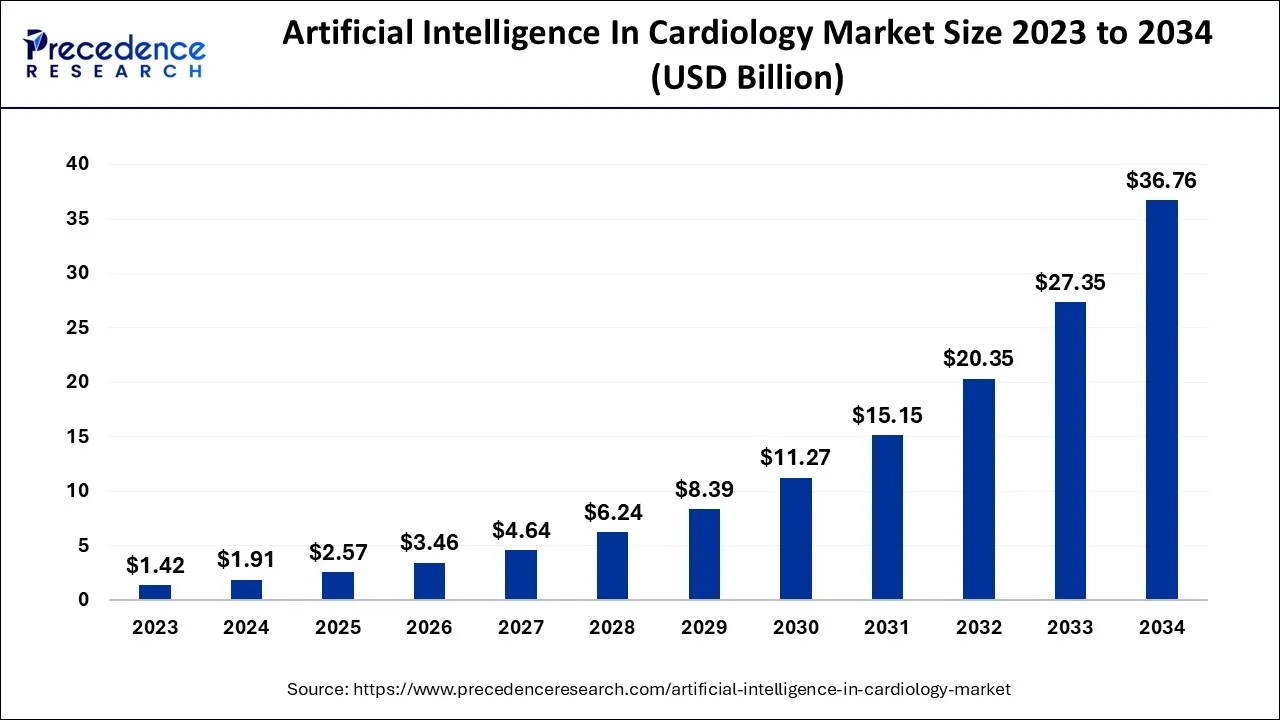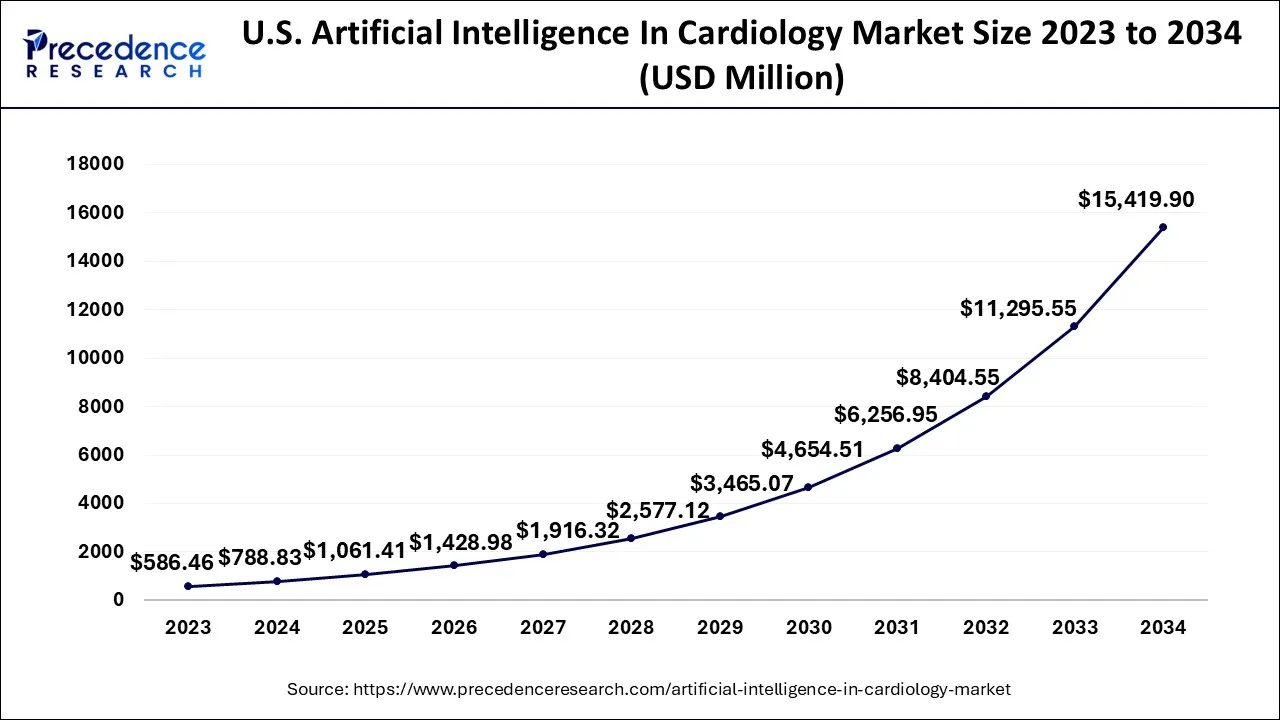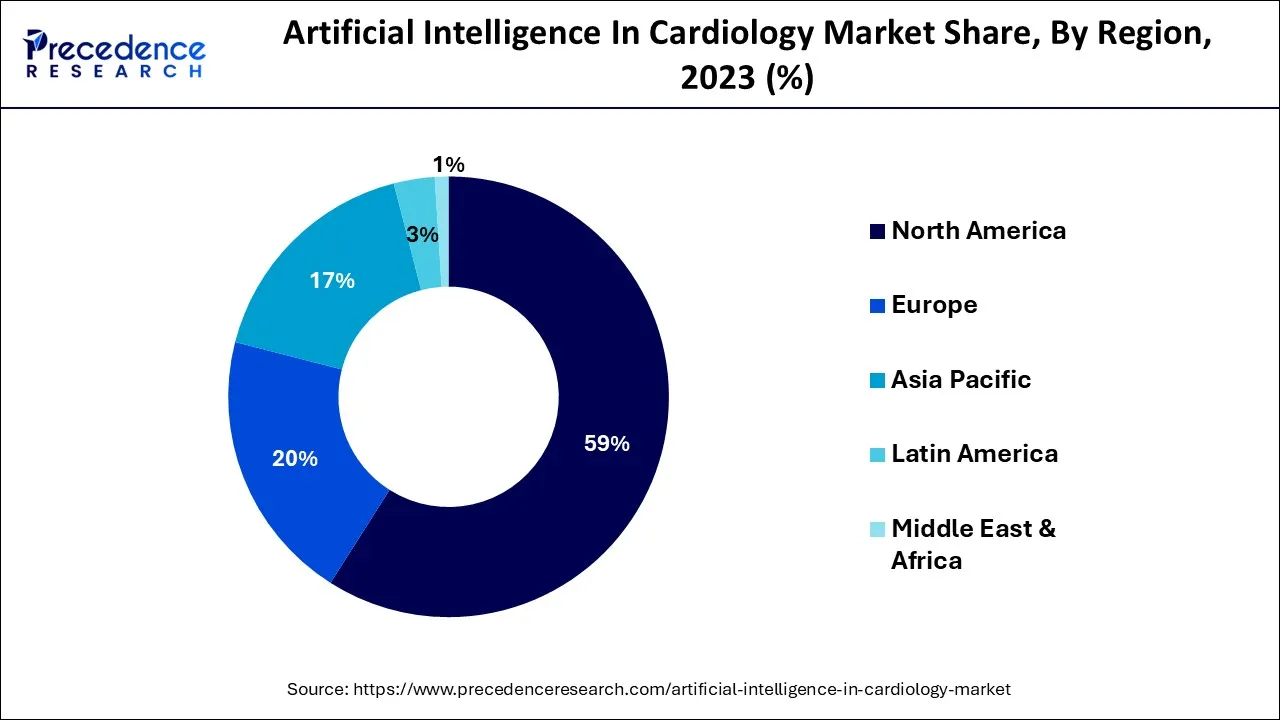What is the Artificial Intelligence in Cardiology Market Size?
The global artificial intelligence in cardiology market size is worth around USD 2.57 billion in 2025 and is anticipated to reach around USD 44.56 billion by 2035, growing at a CAGR of 33.02% over the forecast period 2026 to 2035.

Artificial Intelligence In Cardiology Market Key Takeaways
- North America contributed more than 59% of revenue share in 2025.
- By component, the software segment is expected to dominate the market during the forecast period.
- By application, the ischemic heart disease /cad segment is expected to grow at a significant rate over the forecast period.
How are AI Algorithms Empowering Cardiology?
Artificial Intelligence (AI) in cardiology refers to the application of advanced automated algorithms and machine learning techniques to analyze and interpret medical data related to cardiovascular diseases. AI technology aims to mimic human cognitive functions and decision-making processes, enabling computers to process vast amounts of medical information and learn from patterns and trends within the data. In the context of cardiology, AI can be applied to various aspects of cardiovascular care, including diagnosis, risk assessment, treatment planning, medical imaging analysis, drug discovery, remote patient monitoring, and predictive analytics.
The primary goal of AI in cardiology is to enhance the accuracy, efficiency, and personalized approach to managing cardiovascular conditions, ultimately leading to improved patient outcomes and more effective healthcare interventions. However, it is essential to ensure that AI models are thoroughly validated, ethically used, and integrated into clinical practice safely and responsibly to maximize their benefits for patients and healthcare providers.
As per the National Heart Foundation of Australia, each year, $5 billion is spent on treating admitted patients with CVD, which amounts to 11.1 percent of all admitted health spending and the highest proportion of spending on the healthcare of any disease category.
Artificial Intelligence In Cardiology Market Growth Factors
With advancements in AI technologies, the integration of AI in cardiology has the potential to revolutionize the field, offering innovative solutions to longstanding challenges and contributing to the advancement of precision medicine in cardiovascular care. Artificial intelligence in the cardiology market is driven by growing technological advancements, growing investment by healthcare facilities, increasing collaboration among the market players, growing product launches and increasing government initiatives.
Market Scope
| Report Coverage | Details |
| Market Size in 2025 | USD 2.57 Billion |
| Market Size in 2026 | USD 3.46 Billion |
| Market Size by 2035 | USD 44.56 Billion |
| Growth Rate from 2026 to 2035 | CAGR of 33.02% |
| Largest Market | North America |
| Base Year | 2025 |
| Forecast Period | 2026 to 2035 |
| Segments Covered | Component, Application, and Region |
| Regions Covered | North America, Europe, Asia-Pacific, Latin America, and Middle East & Africa |
Market Dynamics
Driver
Increasing prevalence of cardiovascular disease
Cardiovascular diseases, including heart disease, stroke, and other related conditions, continue to be the leading causes of morbidity and mortality worldwide. The rising prevalence of these diseases has driven the need for advanced technologies, such as AI, to enhance early detection, diagnosis, and personalized treatment. For instance, according to a study published in the Journal of the American College of Cardiology, the expected rates of cardiovascular risk factors and disease would considerably rise in the United States by the year 2060. Beyween 2025 and 2060, all cardiovascular risk factors are anticipated to rise among the general U.S. population, the researchers discovered that heart failure and ischemic heart disease have the biggest anticipated increases in rates, followed by heart attack and stroke. Therefore, the aforementioned facts support the market expansion over the forecast period.
Restraint
Data privacy and security concerns
The use of AI in cardiology involves analyzing vast amounts of sensitive patient data, including medical records, images, and genetic information. The potential chances of data leakage and breaching can limit the adoption of artificial intelligence-based solutions in the healthcare sector. Ensuring data privacy and security is critical to gain the trust of patients and healthcare providers. Compliance with data protection regulations can be a complex and costly process.
Opportunity
Increasing collaboration and partnership
Collaboration between technology companies, research institutions, and healthcare providers fosters innovation in AI applications for cardiology. Partnerships offer opportunities to leverage diverse expertise, accelerate product development, and address specific healthcare challenges. For instance, in July 2023, the Cardiovascular Research Center Aalst, a renowned center for cardiology research, partnered with PMcardio, a market leader in AI-powered cardiovascular diagnostics, to conduct joint research and development. The innovative cooperation aims to open up new avenues in cardiac treatment and enhance patient outcomes by combining PMcardio's cutting-edge technology with the Aalst Center's internationally renowned clinical expertise. Therefore, the increasing collaboration and partnership are expected to offer an attractive opportunity for market growth over the forecast period.
Segment Insights
Component Insights
Based on the component, the global AI in the cardiology market is segmented into hardware, software and services. The software segment is expected to dominate the market during the forecast period. The software applications of AI in cardiology encompass a wide range of tools and platforms that leverage artificial intelligence techniques to analyze medical data, make predictions, and aid healthcare providers in diagnosing and treating cardiovascular disease. In medical imaging, the software is designed to analyze and interpret various cardiac imaging modalities, such as echocardiograms, cardiac magnetic resonance imaging, computed tomography scans and angiograms. These applications use deep learning algorithms to identify and quantify abnormalities, assist in cardiac function assessment, and facilitate early detection of cardiovascular conditions. Thereby, driving the segment growth over the forecast period.
Application Insights
Based on the application, the global AI in the cardiology market is segmented into cardiac arrhythmias, stroke, ischemic heart disease /cad and others. The ischemic heart disease /cad segment is expected to grow at a significant rate over the forecast period. The segment growth is attributed to the growing prevalence of coronary artery disease. For instance, according to the NCBI Journals, the most common cause of death in the US is coronary artery disease (CAD), which is estimated to cause 610,000 deaths annually. It is responsible for 17.8 million deaths per year and is the third biggest cause of mortality in the globe. In the US, the yearly cost of healthcare services for CAD is expected to be more than $200 billion. Even though CAD is a leading cause of mortality and disability. AI-powered medical imaging analysis for CAD involves the use of machine learning algorithms to interpret coronary angiograms, CT scans and other cardiac imaging modalities. These applications can accurately detect and quantify coronary artery stenosis, plaque buildup and other abnormalities, aiding in the early diagnosis and assessment of CAD. Thus, this is expected to drive segment expansion over the forecast period.
Regional Insights
What is the U.S. Artificial Intelligence In Cardiology Market Size?
The U.S. artificial intelligence in cardiology market size is accounted for USD 1,061.41 million in 2025 and is projected to be worth around USD 18,722.02 million by 2035, poised to grow at a CAGR of 33.24% from 2026 to 2035.

What Made North America Dominant in the Market in 2025?
North America is expected to capture the largest market share over the forecast period.The market growth in the region is attributed to the increasing prevalence of cardiovascular disease coupled with rising geriatric population. For instance, according to the data given by the Centers for Disease Control and Prevention, in the US, heart disease is the leading cause of death for members of the majority of racial and ethnic groups. Cardiovascular disease takes one life in the US every 33 seconds. 1 in 5 fatalities in the US are caused by heart disease, which affected a large number of individuals.
Additionally, according to the American Heart Association, the incidence of CVD in US men and women is 40% from 40 to 59 years old, 75% from 60 to 79 years old, and 86% from 80 and above. Furthermore, the strategic collaboration among the key players is expected to propel the market expansion over the projected period. For instance, in May 2023, the American College of Cardiology (ACC) and Acarix, a pioneer in acoustic and AI-based cardiac diagnostics, announced the release of the first version of a framework for the CADScor System. The framework provides a diagnostic assistance process for patients with stable chest pain using the CADScor System. Thus, this is expected to drive market growth in the region over the forecast period.
U.S. Artificial Intelligence in Cardiology Market Trends
With a major share of the market, the US is putting efforts into AI in the electrocardiogram analysis, such as recently Mayo Clinic used AI in smartwatches to screen for a weak heart pump. Whereas the Bunkerhill ECG-EF device, another AI-enabled tool for assessing left ventricular ejection fraction from ECGs, received FDA clearance.

Emergence of a Robust Healthcare Infrastructure is Driving the Asia Pacific
Asia Pacific is expected to grow at the fastest rate over the forecast period. The industry growth in the region is owing to several factors including the growing geriatric population, increasing healthcare infrastructure and growing prevalence of cardiovascular disease. For instance, according to the Asian Development Bank, in Asia and the Pacific, one in four persons will be older than 60 by 2050. Between 2010 and 2050, the number of senior people (those over 60) in the region will quadruple, growing to around 1.3 billion.
China Artificial Intelligence in Cardiology Market Trends
Particular inclusion of the CardioMind system in Shanghai's Zhongshan Hospital initiated trials in early 2025 to develop an independent AI cardiologist. Along with this, China is bolstering AI-assisted imaging to offer high-quality MRI-like images without contrast agents, with minimal spending and side effects.
Elevating Patient Outcomes & Diagnostics Accuracy is Supporting Europe
Europe is expected to grow at a substantial rate during the forecast period. Many hospitals and healthcare facilities across Europe were investing in AI technologies for cardiology. The adoption of AI solutions was driven by the potential to improve patient outcomes, enhance diagnostic accuracy and streamline workflow. For instance, according to the publication by European Commission which was released in June 2023, the EU spent almost $250 million testing AI applications in the fields of industry, food, and healthcare. Thus, this is expected to drive the market growth in the region.
The UK Artificial Intelligence in Cardiology Market Trends
Ongoing use of AI in the detection of critical early signs of heart failure deterioration by utilising voice biomarkers is impacting the expansion. However, a Berlin startup launched a tool, Noah Labs Vox, through the alliance with researchers at the Deutsches Herzzentrum der Charité, to estimate changes in a patient's condition from a simple voice recording via smartphone.
Artificial Intelligence in Cardiology Market Companies
- Vista AI- A company introduced Vista AI Scan, an FDA-approved software solution.
- RSIP Vision- This usually offers tools for non-invasive 3D coronary artery modeling from 2D scans (angiography/CT).
- Ultromics Limited.- It has explored an AI-driven software-as-a-service (SaaS) platform called EchoGo.
- Arterys Inc.- This facilitates diverse AI-enabled, cloud-based solutions for cardiac imaging analysis through its Cardio AI Platform.
- Cardiologs- A firm offering AI solutions to escalate ECG analysis for arrhythmia detection, lower reporting errors, and simplify workflows for clinicians.
Other Major Key Players
- Ultrasight
- DiA Imaging Analysis
- IDOVEN
- Viz ai
- CardiAI
- Cleerly, Inc.
Recent Development
- In May 2023,the "Best New Monitoring Solution" category of the 7th annual MedTech Breakthrough Awards program has been awarded to the AccuRhythmTM AI algorithm technology by Medtronic plc. To help doctors better care for patients with irregular heart rhythms, AccuRhythm AI is an artificial intelligence program that enhances the accuracy of heart rhythm event data from the Medtronic LINQ IITM insertable cardiac monitor (ICM). The Medtronic AI technology stood out among the almost 4,000 nominations received worldwide.
- In February 2023, Cardio Diagnosis Holdings announced the introduction of PrecisionCHD. The newly launched platform is an integrated genetic-epigenetic blood test for early diagnosis of coronary heart diseases. According to the company, this is the second clinical test to deploy artificial intelligence in it.
- In March 2023, the commencement of the American College of Cardiology (ACC) 2023 annual conference in New Orleans saw the introduction of Aidoc's premium, ground-breaking cardiovascular AI solutions package. Aidoc is the industry's top supplier of AI-based healthcare solutions. The cardiovascular solutions from Aidoc automatically combine data, use AI to produce clinical insights for more accurate diagnosis, and expedite communication to assist avoid patients from being lost to follow-up, all of which might lead to an increase in downstream treatments.
Segments Covered in the Report
By Component
- Hardware
- Software
- Services
By Application
- Cardiac Arrhythmias
- Stroke
- Ischemic Heart Disease /CAD
- Others
By Geography
- North America
- Europe
- Asia-Pacific
- Latin America
- Middle East and Africa
 Get a Sample
Get a Sample
 Table Of Content
Table Of Content



